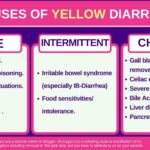Unexplained Diarrhea & No Other Symptoms: 9 causes Explained by a Gastroenterologist.
Our content is not intended nor recommended as a substitute for medical advice by your doctor. Use for informational purposes only.
Unexplained diarrhea is one of the challenging medical conditions in diagnosis. It becomes more challenging when no other symptom exists with it.
Unexplained diarrhea without abdominal pain or other symptoms cannot be attributed to irritable bowel syndrome. This is because abdominal pain is a cardinal symptom of IBS.
So, today we will explain the possible causes of unexplained diarrhea with no other symptoms.
Below are the causes of unexplained CHRONIC or RECURRENT diarrhea. Acute unexplained diarrhea for a few days is not a cause of concern.
Common causes of unexplained diarrhea with no other symptoms include:
- Lactose intolerance and other forms of food intolerance.
- Drugs such as metformin, antibiotics, Gastritis, and GERD medications.
- Bile acid diarrhea.
- Colorectal cancers.
- Stress and anxiety.
- Celiac disease and non-celiac gluten sensitivity.
- Diabetes mellitus.
1- Lactose intolerance (lactase defeciency).
Lactose is a sugar present in milk and dairy products such as ice cream, yogurt, cheese, and others.
Lactose intolerance is way more common than you think. Statistics reveal that up to 25% of the white population has some degree of lactose intolerance. (ref)
And more shockingly, the prevalence of lactose intolerance may reach up to 90% among other races such as blacks, Native Americans, and Asian Americans. (ref).
The classic form of lactose intolerance usually comes with multiple symptoms (similar to IBS with Diarrhea), such as:
- Diarrhea: especially after eating dairy products.
- Bloating and gas.
- Nausea.
- Sometimes, vomiting.
It is more common for lactose intolerance to present with abdominal pain, flatulence, and bloating. However, lactose intolerance can present with unexplained diarrhea with no other symptoms (but this is rare). (ref).
Lactose intolerance came first as it is widely common. and mild cases of lactose intolerance are usually overlooked by the patient and the doctor.
Notice any relation between the intake of dairy products and the development of diarrhea. Consult your doctor or dietitian if you are unsure.
2- Other forms of food intolerance.
Similar to lactose intolerance other forms of food intolerance can lead to unexplained diarrhea.
Diarrhea from food intolerance is accompanied by mild gastrointestinal symptoms (such as colics, bloating, and nausea). In some mild cases, it can also present with unexplained diarrhea with no other symptoms.
Common forms of food intolerances:
- Lactose intolerance (explained above).
- Fructose intolerance: a sugar present in most types of fruits and honey.
- FODMAP intolerance.
- Amines intolerance.
- Caffeine intolerance.
- Alcoholointolerance.
- Salicylates intolerance.
Learn more about types of food intolerance.
Keeping a food journal to record the pattern of your explained diarrhea and its relation to food is important.
The diagnosis of food intolerance is challenging. The similarities in symptoms and the variability in the severity make it more difficult to define food intolerance.
Always consult your doctor if you are unsure about the cause of unexplained diarrhea and its relation to food.
3- Drug-induced diarrhea.
Too many drugs can cause diarrhea. Diarrhea is a relatively frequent side effect, accounting for about 7% of all adverse events of drug therapy (ref).
More than 700 drugs can induce diarrhea as a side effect. Check your list of drugs if you are taking medications for chronic diseases such as Diabetes mellitus, hypertension, or any other chronic disease.
Reviewing your list of medications is the first step to take if you have unexplained diarrhea with no other symptoms.
Common medications that cause diarrhea:
- Metformin.
It is a widely used anti-diabetes medication and is considered the first-line therapy for new cases.
Metformin-induced diarrhea is a very frequent side effect of the drug. Check your anti-diabetes tables as they can be the source of unexplained diarrhea. - Antibiotics.
Antibiotic-associated diarrhea is a frequent side effect of taking antibiotics. Antibiotics cause the death of beneficial microbes inside your gut, disturbing digestion and allowing other harmful organisms to grow.
Common antibiotics to cause such conditions are Penicillin, cephalosporins, and clindamycin antibiotics. - Gastritis and GERD medications:
– Proton Pump Inhibitors such as Esomeprazole (Nexium), Pantoprazole (Protonix), and Omeprazole (Prilosec).
– H2 blockers such as Famotidine and Ranitidine (Zantac). - Chemotherapy.
Used in cancer treatment. - Immunosuppressive medications.
These medications are used to treat immune-mediated diseases such as Systemic lupus, Rheumatoid Arthritis, Immune Thrombocytopenic Purpura, and others.
Examples include Mycophenolate and Methotrexate. - Furosemide (Lasix):
A famous diuretic medication is used in various diseases especially in people with heart disease. - Chronic laxative abuse.
For the complete list, Learn more HERE and HERE.
RELATED: 9 Foods That Cause Diarrhea With Metformin.
4- Bile acid diarrhea.
Normally, Bile is formed inside your liver and stored in the gallbladder. Then it is released into the small intestine to help the digestion and absorption of fat and fat-soluble vitamins.
The largest portion of bile gets reabsorbed again into the blood. Failure of intestinal reabsorption leads to bile acid malabsorption or bile acid diarrhea (BAD).
The trapped bile acids inside the intestine cause catastrophic effects on digestion and overall gut health.
The most common symptoms of BAD are:
- Diarrhea can present alone with no other symptoms.
- The diarrhea is characterized by severe urgency. Sudden severe desire to poop occurs especially after fatty meals.
- The severe urgency may end in some soiling accidents.
- Bloating and indigestion can also occur.
The challenging part of Bile acid diarrhea is its diagnosis. The diagnosis of bile acid diarrhea is usually difficult and its specific tests are not widely available.
Bile acid diarrhea is a common and underdiagnosed condition.
Surprisingly, Some studies estimate that almost 50% of people diagnosed with IBS-diarrhea actually have BAD. (ref), (ref).
Consult your doctor If you experience unexplained diarrhea with no other symptoms.
Bile acid diarrhea is treated with cholestyramine (Questran). Cholestyramine is a bile acid binder. It binds to Bile acids inside your intestine and prevents diarrhea and indigestion.
5- Colorectal cancer.
Unfortunately, abdominal pain is not common with colon cancer (only 3.8% of cases).
The most common symptom of colon cancer is a recurrent or prolonged change in bowel habits. 75% of colon cancer patients report unexplained diarrhea or constipation (reference).
However, You don’t have to panic and expect the worst scenario. diarrhea is a very common complaint. Its presence doesn’t necessarily mean you have colon cancer.
Having risk factors plus other symptoms and signs of colon cancer should raise your attention.
Risk factors of colorectal cancer:
- Being older in age (especially above 45 years old).
- Family history of colon cancer.
- Diabetes mellitus.
- Presence of inflammatory bowel disease (Crohn’s or ulcerative colitis).
- Being African American.
- Obesity.
- High-protein and high-fat diet.
- Smoking andoalcohol.
- Lack of physical activity.
Prevalence of symptoms in colon cancer patients (reference):
- Change in bowel habits (Unexplained diarrhea or constipation): in 75% of patients with colon cancer.
- Blood in the stool (dark or bright red): in 50%.
- A sense of rectal mass: in 25%.
- Anemia (iron deficiency): in 10%.
- Isolated abdominal pain: only 3.8% of cases.
- Other symptoms such as weight loss, unexplained fever, nausea, and anorexia are also present.
Learn more:
Can yellow stool be a sign of colon cancer?
It is IBS or colon cancer, differences explained.
6- Stress and anxiety.
Psychological dysfunction plays a central role in many gut symptoms and diseases. Stress and anxiety can cause a wide range of gastrointestinal diseases and symptoms.
The most common associated disease is irritable bowel syndrome. People with IBS are more likely to have anxiety than the general population (ref).
Unexplained diarrhea with no other symptoms can be a sign of anxiety or mental stress.
Several theories exist to explain this phenomenon. Whatever the mechanism, diarrhea and psychological stress and anxiety links are real. and it is common.
Consult your doctor if your diarrhea is related to stress, anxiety, or any major mental stressor.
7- Celiac disease and Non-celiac Gluten sensitivity.
Celiac disease is an extreme form of food intolerance. In celiac disease, a severe form of sensitivity develops to a protein called gluten.
Gluten protein mainly presents in:
- Wheat and wheat-based foods.
- Rye.
- Barley.
Gluten causes severe chronic diarrhea and malabsorption. Mild forms can start with unexplained diarrhea after ingestion of gluten.
The symptoms of the classical form of celiac include:
- Chronic diarrhea.
- Bloating and gas.
- Nausea and/or vomiting.
- Fatigue and severe iron deficiency anemia.
- abdominal colics.
- Weight loss.
- Sometimes, constipation can also occur.
The diagnosis of celiac disease is usually done by taking a biopsy from the small intestine (via an endoscope). Also, blood tests help the diagnosis.
No specific medication to treat celiac disease. Cutting gluten from food improves the symptoms dramatically.
Other milder form of gluten sensitivity also exists. It is called “non-celiac gluten sensitivity”.
Non-celiac gluten sensitivity causes only mild and short-term effects. Mainly in the form of bouts of unexplained diarrhea, with or without other symptoms. such as bloating and abdominal pain.
8 – Diabetes mellitus.
Over time, high blood sugar can cause damage to the blood vessels and the nerves of the gut tract. This can lead to either speeding up or slowing down gut motility (ref).
Speeding up of the bowel can lead to unexplained diarrhea with no other symptoms.
Another indirect cause of unexplained diarrhea with diabetes is anti-diabetes medications such as metformin and gliptins.
9- Others (rare):
Some other conditions can lead to diarrhea. Usually associated with other symptoms. However, the below conditions can also cause unexplained diarrhea with no other symptoms
A- Some endocrinal diseases.
Many endocrinal diseases can cause unexplained diarrhea:
- Thyrotoxicosis (hyperactive thyroid gland).
- Carcinoid syndrome.
- Medullary carcinoma of the thyroid gland.
- Gastrinoma.
- VIPoma.
- Glucagonoma.
- Somatostatinoma.
- Systemic mastocytosis.
- Addison’s disease.
Learn more about the above condition HERE and HERE.
B- Rare Intestinal disease.
- Tropical sprue.
- Whipple’s disease.
- Eosinophilic gastroenteritis.
- Microscopic colitis.
- Intestinal lymphoma.
- Mesenteric ischemia.
- Radiation to the intestines.
- Chronic giardiasis.
- Intestinal lymphangiectasia.
The above endocrinal and rare intestinal diseases are relatively rare. They are usually associated with other characteristic symptoms other than diarrhea. However, unexplained diarrhea can be an early sign of such diseases.
There is no room to explain such conditions in this article. You need a thorough clinical evaluation by a gastroenterologist if you have unexplained and significant diarrhea.
More:
- Do bananas Help with Diarrhea? Doctor Explains.
- 9 Causes of Diarrhea Every Day (But not Sick) & When to Worry.
- Evidence-based
- Written by a doctor.







